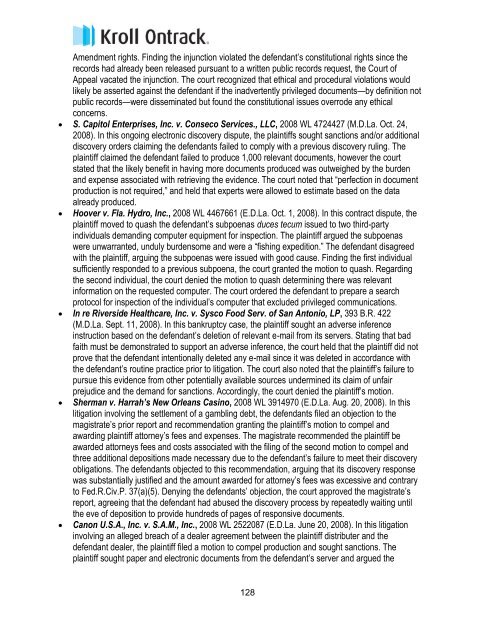Electronic Discovery and Computer Forensics Case List - Kroll Ontrack
Electronic Discovery and Computer Forensics Case List - Kroll Ontrack
Electronic Discovery and Computer Forensics Case List - Kroll Ontrack
Create successful ePaper yourself
Turn your PDF publications into a flip-book with our unique Google optimized e-Paper software.
Amendment rights. Finding the injunction violated the defendant’s constitutional rights since the<br />
records had already been released pursuant to a written public records request, the Court of<br />
Appeal vacated the injunction. The court recognized that ethical <strong>and</strong> procedural violations would<br />
likely be asserted against the defendant if the inadvertently privileged documents—by definition not<br />
public records—were disseminated but found the constitutional issues overrode any ethical<br />
concerns.<br />
� S. Capitol Enterprises, Inc. v. Conseco Services., LLC, 2008 WL 4724427 (M.D.La. Oct. 24,<br />
2008). In this ongoing electronic discovery dispute, the plaintiffs sought sanctions <strong>and</strong>/or additional<br />
discovery orders claiming the defendants failed to comply with a previous discovery ruling. The<br />
plaintiff claimed the defendant failed to produce 1,000 relevant documents, however the court<br />
stated that the likely benefit in having more documents produced was outweighed by the burden<br />
<strong>and</strong> expense associated with retrieving the evidence. The court noted that “perfection in document<br />
production is not required,” <strong>and</strong> held that experts were allowed to estimate based on the data<br />
already produced.<br />
� Hoover v. Fla. Hydro, Inc., 2008 WL 4467661 (E.D.La. Oct. 1, 2008). In this contract dispute, the<br />
plaintiff moved to quash the defendant’s subpoenas duces tecum issued to two third-party<br />
individuals dem<strong>and</strong>ing computer equipment for inspection. The plaintiff argued the subpoenas<br />
were unwarranted, unduly burdensome <strong>and</strong> were a “fishing expedition.” The defendant disagreed<br />
with the plaintiff, arguing the subpoenas were issued with good cause. Finding the first individual<br />
sufficiently responded to a previous subpoena, the court granted the motion to quash. Regarding<br />
the second individual, the court denied the motion to quash determining there was relevant<br />
information on the requested computer. The court ordered the defendant to prepare a search<br />
protocol for inspection of the individual’s computer that excluded privileged communications.<br />
� In re Riverside Healthcare, Inc. v. Sysco Food Serv. of San Antonio, LP, 393 B.R. 422<br />
(M.D.La. Sept. 11, 2008). In this bankruptcy case, the plaintiff sought an adverse inference<br />
instruction based on the defendant’s deletion of relevant e-mail from its servers. Stating that bad<br />
faith must be demonstrated to support an adverse inference, the court held that the plaintiff did not<br />
prove that the defendant intentionally deleted any e-mail since it was deleted in accordance with<br />
the defendant’s routine practice prior to litigation. The court also noted that the plaintiff’s failure to<br />
pursue this evidence from other potentially available sources undermined its claim of unfair<br />
prejudice <strong>and</strong> the dem<strong>and</strong> for sanctions. Accordingly, the court denied the plaintiff’s motion.<br />
� Sherman v. Harrah’s New Orleans Casino, 2008 WL 3914970 (E.D.La. Aug. 20, 2008). In this<br />
litigation involving the settlement of a gambling debt, the defendants filed an objection to the<br />
magistrate’s prior report <strong>and</strong> recommendation granting the plaintiff’s motion to compel <strong>and</strong><br />
awarding plaintiff attorney’s fees <strong>and</strong> expenses. The magistrate recommended the plaintiff be<br />
awarded attorneys fees <strong>and</strong> costs associated with the filing of the second motion to compel <strong>and</strong><br />
three additional depositions made necessary due to the defendant’s failure to meet their discovery<br />
obligations. The defendants objected to this recommendation, arguing that its discovery response<br />
was substantially justified <strong>and</strong> the amount awarded for attorney’s fees was excessive <strong>and</strong> contrary<br />
to Fed.R.Civ.P. 37(a)(5). Denying the defendants’ objection, the court approved the magistrate’s<br />
report, agreeing that the defendant had abused the discovery process by repeatedly waiting until<br />
the eve of deposition to provide hundreds of pages of responsive documents.<br />
� Canon U.S.A., Inc. v. S.A.M., Inc., 2008 WL 2522087 (E.D.La. June 20, 2008). In this litigation<br />
involving an alleged breach of a dealer agreement between the plaintiff distributer <strong>and</strong> the<br />
defendant dealer, the plaintiff filed a motion to compel production <strong>and</strong> sought sanctions. The<br />
plaintiff sought paper <strong>and</strong> electronic documents from the defendant’s server <strong>and</strong> argued the<br />
128

















